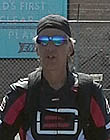|
|
This topic comprises 2 pages: 1 2
|
|
Author
|
Topic: What's the best way to determine the quality and stability of your AC power?
|
|
|
|
|
|
|
|
|
|
|
|
|
|
|
|
|
|
|
|
|
Frank Angel
Film God

Posts: 5305
From: Brooklyn NY USA
Registered: Dec 1999
|
 posted 01-15-2005 11:32 AM
posted 01-15-2005 11:32 AM





quote: Steve Guttag
MOVs will due if you realize they do degrade as they get hit.
Absolutely: this is a serious problem and shouldn't be taken lightly. We have power in the big theatre that ranges from 123vac to 129vac....way higher than is comfortable for many pieces of equipment. And although surge protectors will do nothing to reduce high voltage, we have them on most of our signal processing and computer equipment, as do most people, for spikes and momentary anomolies. But here is a major problem with that, at least in our environment of unusually high, steady-state voltage. As Steve says, as the MOVs get hit and as they age, their threshold for clamping down spikes gets lower and lower. When the voltage is as high as ours, we found out (the hard way) that at some point these surge protectors will simply clamp the high voltage and stay there, overheat....and then fry everything in the unit. A sudden high spike when they are in this "clamped" condition will actually cause them to flame out. I had TWO fires in as many months.
One day in our box office, there was a line spike -- big enough to see lights flicker -- and then three of the surge protectors that computers were plugged into shot fire out of the socket holes while making a nasty hissing sound. This was bad enough, but a few weeks later, one of the big UPS units that weighs about 50lbs which services our main telephone switch, same thing....some "event" on the power line make the aging MOV in it actually go on fire. I was right there to witness it so I unplugged the thing, but flames and smoke continued to pour out of it. I used the handy fire extinguisher that was in the room; while the yellow powder that the extinguish was pumping out was aimed directly at the flaming USP, the fire was quenched, but as soon as I stopped the extinguisher, the damn thing burst into flames again. So here I am, choking on the smoke which quickly filled the room and the offices as I dragged the thing by its AC cord to get it out of the building. Who knows what PCBs were spewing out of that thing along with the smoke. If I weren't in there, that thing would have cause a major fire.
BE CAREFUL surge protectors, especially those in UPSs because, whereas the little power strips will only burn up the few caps and whatnot that are inside them, the MOV that's built into UPS will cause the batteries to burn and once that starts, continue eventhough it is disconnect from any power source. That's not to say that those power strips can't be very dangerous depending where they are located when they decide to fry. If they are placed where is typical, under desks with all kinds of flammable materials pile around them and even on top of them....that little flame that shoots out of the sockets can start a fire if luck isn't on your side.
I looked into this more closely and it seems that a new UL rating has been established that requires there to now be thermal protection in surge protector circuits. Problem is, you don't know if what you are buying has the thermal protection because the old UL spec which DOESN'T have it can still be sold grandfathered. And it will still say UL on it.
Oh, and parenthetically, that fire extinguisher that the college supplied which I used in the electronic equipment closet....that yellow power that it sprayed all over everything....it is corrosive to metal. Any piece of equipment that is anywhere near that powder will be coated with it inside and out because it migrates over everything. The CAT5 patch bays, all the equipment terminals, every electrical connection in the room had to be thoroughly cleaned with solvent. A call to the extinguisher manufacturer confirmed that eventually that coating on any electrical contact surface will corrode it. Nice, huh? So I advise STRONGLY to check what kind of fire extinguishers you are being supplied with. Make sure they are CO2 and not the dry chemical type if they are going to be used anywhere in the vicinity of electrical equipment. If they are found in your projection booth, get rid of them ASAP.
| IP: Logged
|
|
|
|
|
|
|
|
|
|
|
|
All times are Central (GMT -6:00)
|
This topic comprises 2 pages: 1 2
|
Powered by Infopop Corporation
UBB.classicTM
6.3.1.2
The Film-Tech Forums are designed for various members related to the cinema industry to express their opinions, viewpoints and testimonials on various products, services and events based upon speculation, personal knowledge and factual information through use, therefore all views represented here allow no liability upon the publishers of this web site and the owners of said views assume no liability for any ill will resulting from these postings. The posts made here are for educational as well as entertainment purposes and as such anyone viewing this portion of the website must accept these views as statements of the author of that opinion
and agrees to release the authors from any and all liability.
|

 Home
Home
 Products
Products
 Store
Store
 Forum
Forum
 Warehouse
Warehouse
 Contact Us
Contact Us




 Printer-friendly view of this topic
Printer-friendly view of this topic












![[Big Grin]](biggrin.gif) )
)![[Smile]](smile.gif)



